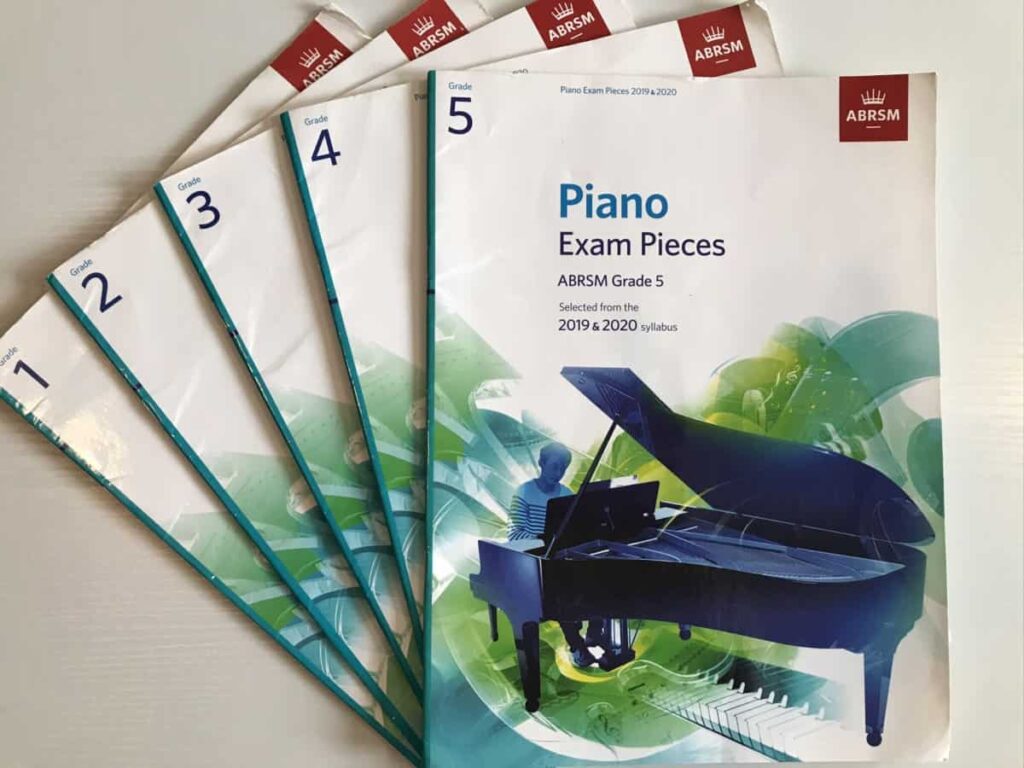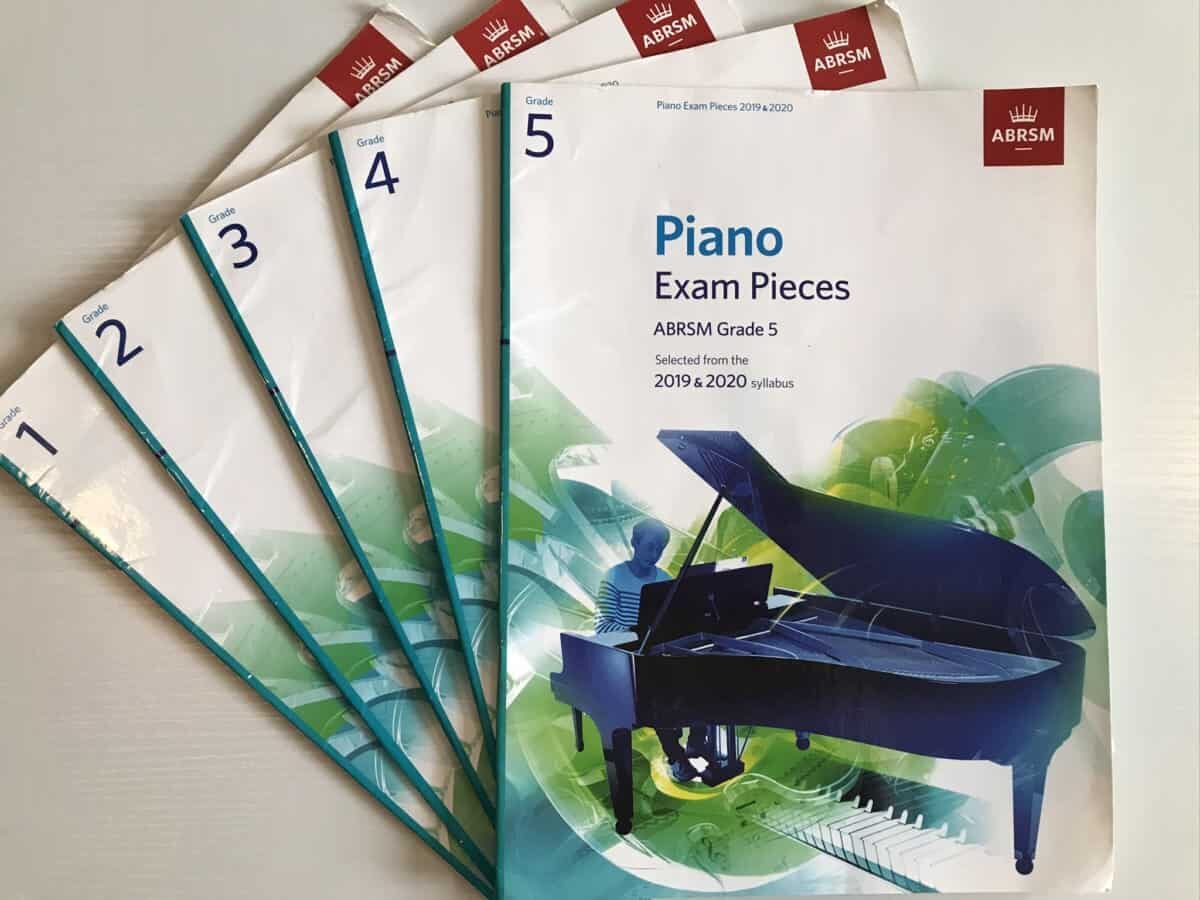Piano students who are working through the music grades system often wonder whether it is better to work through every grade, or whether it is okay, or better even, to skip some of them. There are some compelling reasons for different decisions for you to consider, to figure out what is best for you or your child.
You can skip piano grades if you want to. There are no rules from the exam boards to stop you. Some common grades to skip are grades 2, 4, and either 6 or 7 i.e. you would take grades 1, 3, 5, either 6 or 7, and 8. If piano is your second instrument then it is fairly common to skip grades 1 to 4 and have your first grade exam be grade 5.
It is also extremely common to skip any pre-grade 1 assessments such as a prep test or the Initial grade, and begin piano exams at grade 1. At the other end of the scale, some people who simply want a qualification will only take the grade 8 exam, providing that they have the relevant music theory qualifications already.
If you have a goal in mind of the grade that you ultimately want to achieve, for example grade 8, then that is the only grade exam that it really matters that you take. The other grades are there to guide your learning and help you pace yourself.
Here I will talk about some reasons to take the grade exams, some reasons why it might be best to skip a grade, and some reasons to skip learning the syllabus materials entirely.
Reasons to Take All the Piano Grades
Whilst the music grade system is not for everybody, there are some great benefits to learning and being assessed in this way:
The Structure
Learning piano guided by the grades system is one good way to progressively improve your piano playing. Whilst any good teacher can help you to improve your playing without using any grade materials, the grades syllabus is one option of how to pace your learning appropriately.
For example, the way that only a few scales are taught at grade 1, and then a few scales are added each time as you progress through the grades, is one good way to introduce scales without the risk of overwhelming, but progressively challenging the student.
The Motivation
Working towards piano grades can be motivating in a number of ways:
If you have an exam coming up, that often provides a strong motivation to practice, either out of nerves or out of a desire to perform well.
As well as the motivation to practice, passing a piano exam can be incredibly motivating to inspire you to work towards the next one.
Grades also provide a great way to measure your progress and see how much you have improved in a tangible way. Because playing a musical instrument is a skill that takes a long time to develop, people can often get frustrated when they feel like the time they have put in practising has not paid off. Having an official standard of playing that once seemed difficult to you but now seems too easy for you is great proof that you really have improved.
I often have adult piano students who want to learn the piano grade materials without actually taking the exam, because it’s a great way to track the progress of the learning and keep you motivated to play harder pieces.
Exams are Practice Performing under Pressure
Piano exams are a great way to get used to playing in front of people. For many people, music exams are the first opportunities that they have to perform in front of people they don’t know.
Getting used to how it feels to be nervous, and how to perform well under pressure, are great things to learn.
This is directly helpful if you go on to play in concerts or other musical performances later on, but even if you don’t end up pursuing music in the future, the skill of performing well under pressure can be transferred to other areas of life such as public speaking.
If Qualifications Are Needed by an Institution
The ultimate purpose of music grades is to enable people to prove that they are at least a certain standard on their instrument. Whilst it is not usually a good idea to compare yourself to others, sometimes certain qualifications are required by institutions.
Some musical groups e.g. orchestras may have entry requirements that include being at least a certain grade. Whilst in an ideal world they would audition everybody and assess their standard for themselves, requiring people to have taken a certain exam ensures that everyone is at least the level they are looking for.
There are some other situations where having music qualifications can be helpful, for example to get UCAS points if you are applying to university.
Grades are an easy way to prove your minimum standard of playing, without having to hope that people will take your word for it.
Despite this, there are many situations where it can make sense to skip one or more piano grades:
Reasons to Skip a Grade Exam
Here are some common reasons for skipping a grade:
Timing
Grade exam seasons are only usually three times a year. These times do not always line up with the pace that you are learning at.
Because you have to enter for an exam a few months before the exam it self, it may be difficult to estimate whether or not you will be ready when the exam date comes.
Sometimes people overestimate how much they will practice, or other life things get in the way, and they end up underprepared when the exam comes around.
Conversely, if you wait until you are exam-ready before you enter for the exam, then you have to practice the same pieces over and over until the exam comes, when you could have spent that time learning harder pieces. This can hold back your progress a bit.

Sometimes it works out better to get the grade materials up to a standard that you are happy with and are fairly confident would pass the exam, and then move on to learning the next grade, without having to worry about timing your progress to match an exam date.
Adult learners especially, or anybody who already plays another instrument before learning piano, often progress at a quicker rate than the three exam seasons a year structure is really designed for.
Along the same lines, if you are ready to take an exam but you end up missing the entry deadline for the upcoming exam season, or if for any reason you end up not being able to attend the exam on the day, it can often make more sense to move on to the next grade rather than waiting months for the next exam season.
Money
Learning an instrument can get very expensive. After paying for the instrument itself, its maintenance, the lessons and the sheet music, you then have to pay to enter the grade exams if that’s what you want to do.
If you (or your child) are not fussed either way about taking all the exams then it is perfectly fine to save a bit of money and skip some exams.
If You Just Don’t Want To
If you are just learning for your own enjoyment, and don’t want the pressure of being examined or playing in front of anyone, then that is as good a reason as any to not take some or any of the grade exams.
It can still be beneficial to follow the structure of the syllabus for the reasons mentioned earlier if that works for you, without the stress of having an upcoming exam.
If you have decided not to take one or more grade exams, then there are also reasons why it could make sense to skip learning the grade syllabus materials entirely:
Reasons Not to Follow the Grades Syllabus Structure
It is perfectly possible, and for some people more beneficial, to learn piano and work through repertoire of progressing difficulty without ever following any grade syllabus.
Any good teacher can tailor the pieces that you learn to give your learning structure, to allow you to progress quickly, and to allow you to enjoy the pieces that you are playing.
If you don’t like the pieces that are set on the piano grade syllabuses, then you don’t need to make yourself learn them just for the sake of getting better at piano.
The amount of piano repertoire out there is massive, and as you are most likely learning piano for enjoyment at the end of the day, there is no need to limit yourself to the choice of 18 set pieces. You can spend your time practising pieces that you enjoy, and still get as much improvement in your piano skill from them.
Even for people who do learn the grade pieces, it is still essential to play a variety of pieces outside of those set for grades as well that you will enjoy and that give you experience playing in a range of styles.
If you have a piano teacher, follow their advice on which standard of pieces would be best to learn in order to get you where you want to be.
If you are teaching yourself, it can sometimes be tempting to attempt to tackle a piece that is significantly more difficult than anything you have played before. This can take ages and can be very discouraging.
Usually it is more beneficial for your overall skill to instead increase the difficulty of the pieces you are learning ever so slightly each time instead of jumping in at something really difficult. This is where following some sort of structure like the grades provide can be helpful.
However, most people find that having a piano teacher is really helpful, because you have access to a personalised, tailored approach to your learning with individual feedback that you can’t get elsewhere.
That way you can get your teacher’s advice on your individual situation and get a more personalised answer to whether it would be best for you to skip grades.
Overall, whether you choose to take piano grades or not is an entirely individual choice. You can discuss which route is best for you with your piano teacher. I have some students taking grades, some learning the grade materials but not taking the exam, and some ignoring the grade system completely. It just depends on what suits you best.
Frequently Asked Questions:
How Long Does It Take to Get to Grade 1 Piano?
How Long Does It Take to Get to Grade 8 Piano?
Can You Skip Two or More Piano Grades at Once?
You can skip as many piano grades at a time as you want. Just make sure that you learn some pieces that are around the standards that you are skipping, so that you have the foundational skills in place for when you take a higher grade.
Can You Skip Music Theory Grades?
You can skip music theory grades in a similar way to piano grades or any other instrumental grades. Because grade 5 music theory is a prerequisite for ABRSM grades 6 to 8, the majority of people skip straight to taking grade 5 music theory without grades 1 to 4.

